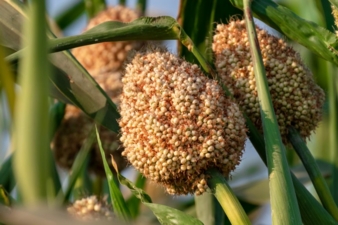21/08/2025 – New natural fiber
Reinventing fashion with sorghum
When most people think of eco-friendly fashion, cotton and bamboo are often the materials that come to mind. There is a new fibre that is making waves, and that is sorghum fibre.
This resilient crop that is best known for thriving in dry climates and feeding may nations is starting to step into the spotlight as a sustainable alternative for making durable, breathable fabrics. So, what makes sorghum a great choice of material for textiles? Sorghum is environmentally friendly and takes far less water to grow than other fibres. It can be grown in areas where other crops struggle and plays a huge role in reducing pressure on fertile farmland and water sources. In fact, many farmers already use sorghum as a sustainable solution, and now textile manufacturers are discovering its second life beyond the field.
The stalks of the sorghum plant can be turned into fibres that are lightweight, but strong. This makes them perfect for clothing that need to be both tough and comfortable. This includes breathable summer shirts, everyday trousers, or even sporty outerwear. The fabric made from sorghum fibres allows air to circulate, which keeps the wearer cool, and is ideal for warm climates or active lifestyles.
Additionally, there has been a growing interest in clothing that has natural-looking, earthy textures and tones, and sorghum fabric fits beautifully into that aesthetic. Designers are beginning to experiment with sorghum-based materials not only for their green credentials, but also for their unique texture and natural beauty.
Sorghum is already widely grown around the world, especially in Africa, India, and the United States. Traditionally, the stalks were burned or discarded after the grain was harvested. Now, those same stalks can be used to create fabrics – transforming what was once waste into something valuable. That means a lower carbon footprint and more income opportunities for farmers.
As the world looks for better ways to live sustainably, the fashion and textile industries are under growing pressure to clean up their acts. While fabrics made from synthetic materials such as polyester and nylon, which are derived from fossil fuels and take hundreds of years to decompose, sorghum is 100% biodegradable. Sorghum fibres are more than just a passing trend. They represent a step forward in creating fashion that’s kind to people and the planet.





